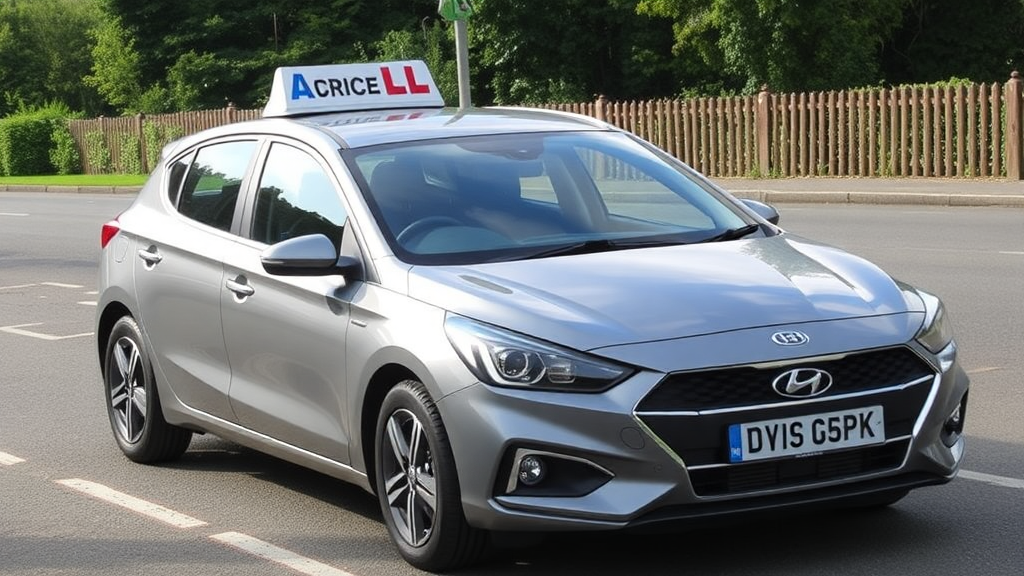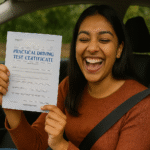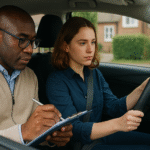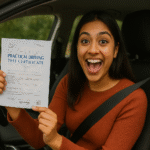Practical Driving Test Booking: Steps You Need to Know
Booking your practical driving test is an essential step in your journey to getting your driver’s license. Understanding the process can help make it smoother and less stressful. Follow these straightforward steps to ensure you’re ready to hit the road.
Check Eligibility
Before you start the booking process, it’s vital to ensure you’re eligible for the practical driving test. Here are a few key eligibility requirements:
- You must hold a valid provisional driving license.
- You need to have successfully passed your theory test.
- Ensure you meet the minimum age requirement for your country.
Gather Required Information
Once you’ve confirmed your eligibility, gather the necessary information before proceeding to book your test. This includes:
- Your driving license number.
- Your theory test pass certificate number.
- Your personal details, such as name and address.
Choose a Booking Method
There are several ways to book your practical driving test. You can choose the method that best suits you:
- Online: The most convenient way. Visit the official driving test booking website and follow the on-screen prompts.
- By Phone: Call your local driving test booking center. Have your details at hand to make the process quicker.
- In-person: If you prefer face-to-face interaction, you can visit your local licensing authority’s office.
Select Your Test Center
When booking your test, you will need to choose a test center. Consider the following when selecting a location:
- Proximity to your home for convenience.
- Familiarity with the area to reduce anxiety.
- Availability of dates at the chosen center.
Pick Your Test Date and Time
Once you have selected a center, it’s time to choose a date and time for your test. Keep these tips in mind:
- Book your test well in advance to secure your preferred date.
- Select a time when you feel most alert and capable.
- Consider your schedule to avoid last-minute stress.
Pay for Your Test
After selecting the date and time, you will need to pay for your practical driving test. Payment options may include:
- Credit or debit card online.
- Cash or card if booking in person.
- Phone payments if booking by phone.
Keep your receipt or confirmation number, as you’ll need it on the day of your test.
Prepare for Your Test
With your booking complete, it’s time to prepare. Here are some effective ways to get ready:
- Practice driving regularly to build confidence.
- Review the driving test criteria so you know what examiners will look for.
- Consider taking lessons with a qualified instructor to address any weaknesses.
What to Bring on Test Day
On the day of your practical driving test, ensure you have the following items ready:
- Your valid driving license.
- Your theory test pass certificate.
- Your appointment confirmation.
- A roadworthy vehicle, if applicable.
Having these documents readily available will help prevent any delays or issues.
Handling Cancellations or Changes
If you find yourself needing to change or cancel your booking, it’s essential to know the rules:
- Most booking systems allow changes or cancellations up to 2-3 days before the test date.
- Check if there’s a fee associated with rescheduling.
- Always confirm your new booking details after making changes.
Booking a practical driving test may seem daunting, but by following these steps, you can navigate the process easily. Remember that preparation is key, and being organized will help you feel more confident when the day arrives. Good luck, and safe driving!
Common Mistakes to Avoid When Booking Your Driving Test
Booking your driving test can feel overwhelming, especially with all the options and rules involved. To make things easier and help you secure a date that meets your needs, let’s explore some common errors many people encounter when booking their practical driving test.
Not Checking Required Documents
Before booking your test, ensure you possess all the required documents. Missing documentation can delay your process or result in having to reschedule. Key documents include:
- Your driver’s license number
- Proof of your identity (such as a passport)
- Any payment information needed for booking fees
Double-check the requirements in your specific region as they may vary, ensuring you have everything in place for a smooth booking process.
Choosing an Inconvenient Date and Time
When selecting your test date, take into account your personal schedule. Consider the following:
- Your availability to practice leading up to the test
- The proximity of test centers to your location
- Peak times when the waiting list may be longer
Many applicants mistakenly choose dates without considering their availability for last-minute practice or even work commitments. Aim for a time when you feel most prepared and confident.
Ignoring Test Route Familiarity
While booking your test, it’s crucial to think about the test routes that will be used. Ignoring this might lead to unnecessary anxiety. Familiarize yourself with common test routes around your booking center:
- Practice drives in the area of the test center
- Understand local speed limits and road signs
- Know where high-traffic areas may be, especially during the time of your test
Gaining familiarity with test routes can significantly improve your confidence and performance on the day of the exam.
Not Reviewing the Cancellation Policy
Testing dates can sometimes clash with unforeseen circumstances. Therefore, it’s wise to read through the cancellation and rescheduling policies of your driving test service. Here are some considerations:
- Are there fees associated with cancellations or rescheduling?
- What notice period is required to reschedule without penalty?
Being informed can save you time and money if you need to change your test date.
Underestimating the Importance of Test Preparation
Many believe that merely booking the test is sufficient, but preparation is key. Make sure to:
- Have a qualified instructor evaluate your driving skills beforehand
- Practice specific maneuvers that are commonly tested
- Understand what is required for a pass
Neglecting to prepare can result in failure, which can be disheartening and add to your stress about rescheduling.
Failing to Check for Online Booking Scams
Unfortunately, not all websites that appear to offer booking assistance are legitimate. To avoid scams, always ensure you are booking through the official driving authority’s website or a reputable service. To identify a reliable site:
- Look for official contact information
- Check for reviews or testimonials about the website
Being cautious can save you from potential fraud.
Neglecting to Prepare for the Day of the Test
When the day finally arrives, ensure you are fully prepared. Consider the following checklist:
- Get a good night’s sleep before the test
- Arrive early to avoid unnecessary stress
- Bring all required documentation and identification
Preparation on the test day can significantly influence your overall performance and calm your nerves.
By avoiding these common mistakes, you can enhance your chances of passing your practical driving test on the first attempt. Stay organized, well-prepared, and confident, and you’ll be on the road in no time.
The Importance of Choosing the Right Time for Your Driving Test
Choosing the right time for your driving test is crucial for a number of reasons. It can significantly affect your performance, confidence, and the outcome of the test. Understanding why timing matters and how to strategically select your test date will help you achieve the best results.
First and foremost, consider your personal schedule when booking your test. Make sure to pick a time when you can fully focus without distractions or stress. If you’re juggling school, work, or family obligations, it’s best to avoid scheduling your driving test on days that are likely to be chaotic. By selecting a time when you feel relaxed and prepared, you’ll increase your chances of passing.
Moreover, the time of day can greatly influence your driving experience. Morning and afternoon periods can present different challenges:
- Morning: Traffic is typically lighter, which may lead to reduced stress and fewer obstacles.
- Afternoon: Expect increased congestion, especially near schools and businesses.
Also, weather conditions play a significant role in your driving ability. If you have the option, try to book your test when the weather is more predictable. Rain, snow, or fog can add layers of difficulty to your test. Always check the forecast as your test date approaches, and reschedule if the expected conditions could negatively impact your performance.
Anticipating holidays and special events is another important factor. Traffic around holiday times can be unpredictable and busy, which may diminish your ability to drive effectively. If possible, plan your test for a period that’s free from major holidays or community events, allowing you to focus on your driving skills rather than worrying about other road users.
Here’s a straightforward table to help you weigh your options:
| Time of Day | Pros | Cons |
|---|---|---|
| Morning | Less traffic, fresher mind | Some instructors may be less available |
| Afternoon | More instructional availability | Increased traffic, potential stress |
Consider the duration of your learning process. Are you ready to take the test shortly after your last driving lesson? Sometimes, waiting a bit longer can strengthen your skills. If you feel you’re just about ready but want a little more practice, don’t hesitate to take more lessons before booking the test. Your confidence and preparation are key elements to a successful driving test. Use the extra time to fine-tune your skills and solidify your confidence on the road.
In addition, think about your learning style. Some learners perform better with more practice, while others thrive on immediate action. Reflect on your learning experiences and how they align with your timing. If you prefer a steadier approach, ensure you have ample practice before taking the test. Conversely, if you’re confident in your skills, don’t hesitate to book sooner rather than later. Optimizing your schedule can lead to enhanced results.
Conversion of practice into real-world driving experience is essential. Each hour spent behind the wheel builds your competence. Thus, your choice of timing should also account for the number of practice hours you have completed. Aim for at least 20-30 hours of driving practice before attempting the test. Consider a few mock tests as well, which can further boost your confidence and readiness.
Psychological readiness matters too. If you’re feeling anxious, try mindfulness techniques or breathing exercises to ease pre-test nerves. This is especially important just before your scheduled test. Being in the right mental space can make all the difference between success and failure.
Ultimately, the right time for your driving test is a combination of preparation, practice, and understanding external factors that could impact your performance. Consider your own circumstances, carefully choose a day and time that aligns with your personal strengths, and approach the test with confidence. Following these strategies will not only prepare you better but also improve the likelihood of a successful outcome, paving your way to freedom on the road.
How to Prepare for Your Driving Test After Booking
Booking your practical driving test is a significant step towards earning your driver’s license. Now that you have a date set, it’s essential to prepare thoroughly to increase your chances of passing. Here’s how you can effectively get ready for your driving test after booking your appointment.
Understand the Test Format
Before your test date arrives, familiarize yourself with what to expect during the practical driving assessment. Knowing the structure of the test helps alleviate anxiety and boosts your confidence. The test typically includes:
- Pre-Driving Checks: You may be asked questions about vehicle safety and maintenance.
- Basic Control Tasks: These might involve parking, reversing, or turning at controlled intersections.
- On-Road Driving: You’ll demonstrate your ability to navigate real traffic conditions, which includes obeying traffic lights and road signs.
Practice, Practice, Practice
Nothing beats practical experience. Make sure to schedule ample driving practice leading up to your test. Concentrate on the following key areas:
- Defensive Driving: Learn to anticipate the actions of other drivers.
- Parking Skills: Spend time perfecting parallel parking, angle parking, and reversing into a parking spot.
- Understanding Traffic Signs: Make sure you know the meanings of all road signs, lines, and signals.
Track your progress in a practice log to monitor improvements and focus on areas that need more attention.
Consider Professional Lessons
If it’s been a while since you last drove or if you feel uncertain about your skills, invest in a few lessons with a certified instructor. They can provide invaluable insights and correct any bad driving habits you may have developed. Instructors will also offer tips on what the examiner will focus on, allowing you to be more prepared.
Gather Required Documentation
Before the day of your test, ensure you have all necessary documents ready. This typically includes:
- Your learner’s permit.
- A form of identification, such as a passport or ID card.
- Your driving test booking confirmation.
Check with your local licensing authority for any additional documents required to avoid unexpected delays on test day.
Plan Your Test Day
How you handle the day of the driving test is crucial. Follow these steps to ensure everything goes smoothly:
- Get Enough Rest: Ensure you have slept well the night before. Fatigue can impair your concentration.
- Arrive Early: Allow yourself enough time to arrive at the testing location. This avoids added stress if you encounter unexpected traffic.
- Prepare Mentally: Spend a few moments calming your nerves before the test starts. Deep breathing or positive affirmations can be helpful.
Stay Calm During the Test
Once your test begins, stay as calm as possible. Focus on each task one step at a time rather than worrying about the outcome. Remember that every new driver experiences nerves, and examiners are trained to look for safe driving rather than flawless performance.
Post-Test Reflection
Regardless of the outcome, take some time to reflect on your experience after the test. If you pass, celebrate your accomplishment! If not, don’t be discouraged. Identify the areas you struggled with and create a plan to improve them before your next attempt.
Preparing for your practical driving test after booking doesn’t have to be daunting. With the right mindset, adequate practice, and organization, you can set yourself up for success. Utilize the tips above to navigate this exciting step towards becoming a licensed driver!
Understanding Cancellation Policies for Driving Test Bookings
When it comes to securing your future on the road, booking your practical driving test is a crucial step. However, understanding the cancellation policies related to driving test bookings can often be complex. This knowledge not only helps you avoid unnecessary fees but also keeps you prepared for any unexpected circumstances that might arise before your test date.
Why Understanding Cancellation Policies Matters
Cancellation policies vary by region and can change based on the governing body of driving tests. By familiarizing yourself with these regulations, you gain several benefits:
- Preventing Unexpected Fees: Knowing the cancellation timeframe can help you avoid charges that could arise if you cancel too late.
- Rescheduling Opportunities: Some policies allow easy rescheduling, which can keep your driving plans on track.
- Understanding Penalties: Awareness of specific penalties helps you make informed decisions about whether to cancel or attend.
Typical Cancellation Policies
While specifics can vary significantly, most driving test organizations have several common elements in their cancellation policies. Here’s a quick overview of what you can expect:
| Timeframe Before Test | Action Required | Possible Fees |
|---|---|---|
| More than 3 weeks | Free cancellation or rescheduling | None |
| 1-3 weeks | Cancel or reschedule | Possible small fee |
| Less than a week | No show or late cancellation | Full test fee may be charged |
What to Do if You Need to Cancel
If you find yourself needing to cancel, taking prompt action is essential. Here are the steps you should follow:
- Check the Cancellation Policy: Review your confirmation email or the official website for your driving test authority to understand their specific policies.
- Contact the Right Authority: Reach out to the booking agency or your local driving authority immediately to handle your cancellation. Stay courteous to ensure a smoother process.
- Document Everything: Keep a record of your communications, confirmation of cancellation, and any fees you may have paid. This documentation can help resolve any potential disputes.
Tips for Avoiding Cancellation Wrinkles
Here are some handy tips to help you navigate cancellation situations more smoothly:
- Set Reminders: Utilize calendar apps to set reminders for your test date. This way, you won’t forget to attend, and it will help you avoid cancellation altogether.
- Stay Informed: Regularly check the official website for any updates on cancellation policies.
- Consider Early Scheduling: Booking your test several months in advance gives you more flexibility in your schedule, minimizing last-minute cancellations.
Understanding Special Circumstances
Life can be unpredictable, and sometimes you need to cancel due to unforeseen circumstances such as illness or emergencies. Most driving authorities have provisions for these situations, allowing for late cancellations under certain conditions. You will likely need to provide proof—such as a doctor’s note—when applicable.
The Importance of Communication
In any cancellation scenario, effective communication with the driving test authority is key. A polite inquiry regarding your options can often yield more favorable outcomes. Being open about your situation may also help you learn about alternative solutions that you might not have considered.
A Final Word on Cancellations
While cancellation policies can be a bit daunting, understanding them can empower you in your driving journey. Remember, staying proactive and informed is essential. Navigating cancellation and rescheduling can be straightforward if you keep these practices in mind. Remember, the goal is to ensure you’re well-prepared for your practical driving test while avoiding unnecessary roadblocks along the way!
Key Takeaway:
When it comes to securing your practical driving test booking, understanding the process and preparing accordingly is crucial for success. First and foremost, familiarize yourself with the essential steps needed to book your driving test. This typically involves determining your eligibility, selecting a test center, and scheduling your appointment online or via phone. By adhering to these steps, you can ensure that you have completed the necessary groundwork before you take on the challenge of the actual driving test.
However, the booking process can be fraught with pitfalls. One significant area to focus on is avoiding common mistakes. Many learners either rush through the process or neglect to double-check their personal information, leading to unnecessary complications. Additionally, it’s important to choose the right time for your driving test. Factors such as traffic conditions, weather forecasts, and your own peak productivity hours can significantly influence your performance on the day of the test. Booking your test during a quieter time can alleviate anxiety and allow you to focus better.
Once you have secured your booking, your preparation should take center stage. Practicing specific driving maneuvers and becoming comfortable with the test route can boost your confidence. Create a plan that includes a variety of driving situations, ensuring you feel ready for anything the examiner may present.
Understanding the cancellation and rescheduling policies is key. Life can be unpredictable, and it’s wise to know the terms regarding cancellations or changes to your booking. Having this knowledge can save time and funds while allowing for flexibility in your schedule.
Effective preparation for your practical driving test booking encompasses thorough planning, avoiding common pitfalls, selecting an appropriate test time, and being cognizant of cancellation policies. By focusing on these elements, you can improve your chances of passing the test and paving the way for your driving journey. After all, thorough preparation is not just about passing a test; it’s about gaining the confidence needed to become a safe and responsible driver.
Conclusion
Booking your practical driving test can be a significant step toward gaining your independence on the road. By following the right steps, you can make this process smoother and more efficient. Remember to avoid common mistakes, such as booking at peak times or failing to check your documents beforehand. Choosing the right time for your test can greatly impact your performance, so consider your personal peak focus hours when scheduling.
Preparation is crucial after you’ve secured your booking. Practice regularly, review the rules of the road, and take time to calm your nerves before the big day. It’s also essential to understand the cancellation policies associated with your driving test. Knowing what to expect if circumstances change can spare you from unnecessary stress and help you plan accordingly.
Ultimately, the journey to passing your practical driving test starts with informed choices. Whether it’s the timing of your test or the preparation you undertake afterwards, every aspect plays a vital role in your success. By taking these steps and using the tips shared in this article, you can approach your driving test with confidence and increase your chances of passing on your first attempt. As you embark on this journey, remember to stay focused, practice diligently, and remain positive—every effort you put in will bring you closer to that much-anticipated driving license.






Leave a Reply